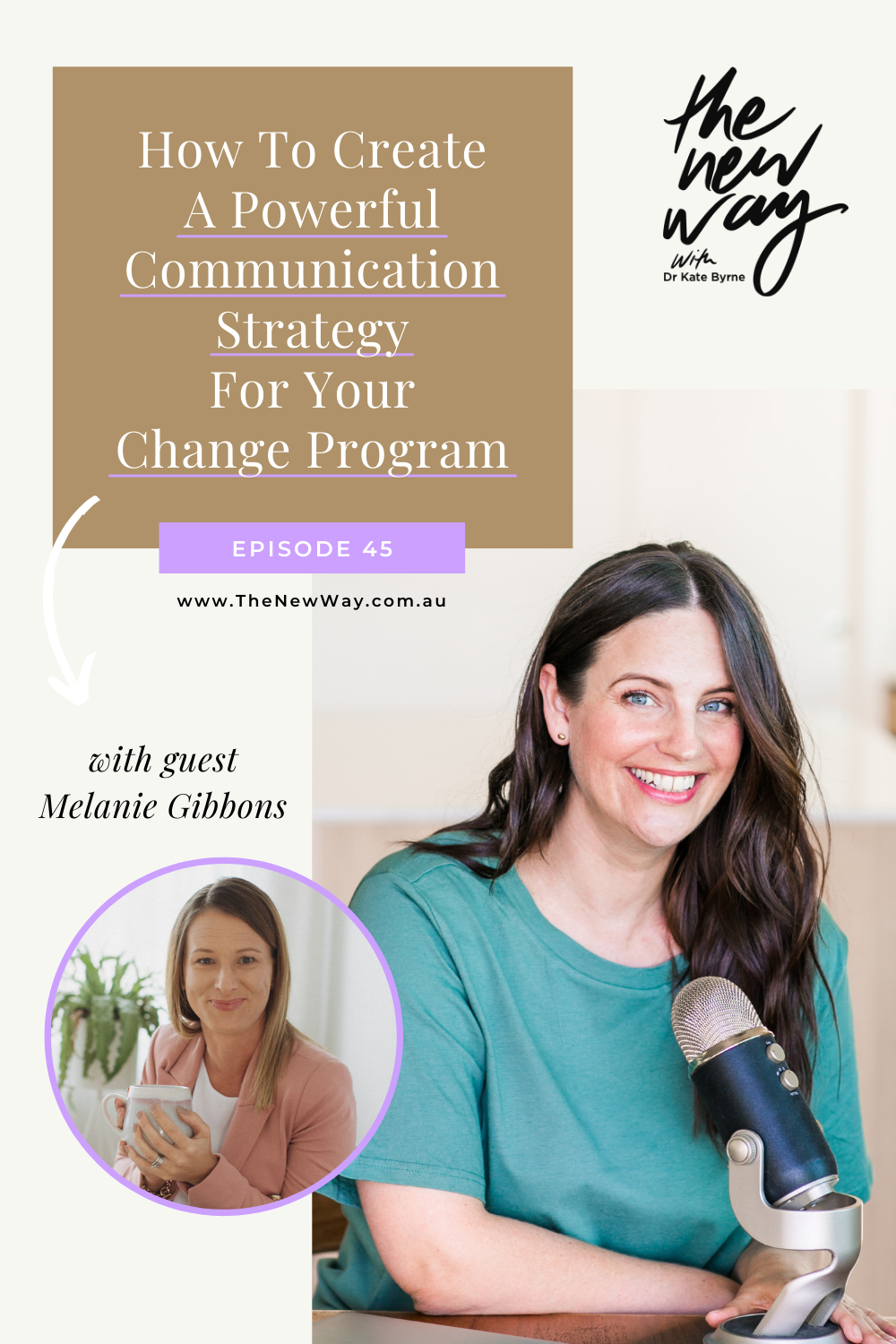How To Create A Powerful Communication Strategy For Your Change Program with Melanie Gibbons
What do you think is the most underrated skill set for change managers? I’d say it’s professional communication skills.
Most change managers and leaders are not communication professionals, which is totally fine, but it means they aren’t taking advantage of the huge opportunities that smart, considered communications can make to the success of your organisational transformation or change program.
This week’s episode of The New Way podcast is going to be a game changer for you!
My guest today is Melanie Gibbons. Mel is the founder of Elm Communications, a consultancy that focuses on providing strategic communication services across government, not-for-profit and the private sector in Australia. Mel is also President of the International Association of Business Communicators in Canberra.
Listen in to discover:
Exactly what to include in your communication strategy
Whether you need a strategy or not (Mel says you don’t always need one!)
How to take your communications from helping to build awareness to helping to deliver behaviour change
How to communicate when the change you’re delivering isn’t going to be welcomed
Melanie shares so many practical tips that you’ll want to add to your toolkit. This is a really valuable episode!
Take a listen now.
TOPICS DISCUSSED AND WHERE TO FIND THEM:
[3:08] Smart, effective communication is the most underrated part of outstanding organisational change management.
[4:23] Communication is often seen as a ‘tick the box’ exercise. However, effective, planned, strategic communication is really about understanding an audience, what they need to know and how to reach them effectively.
[5:10] Internal communications are vital, but staff are often the most complex audience. They can be your biggest advocate or biggest detractor.
[7:04] Mel breaks down what is an effective communications strategy.
[7:54] The key to a good communications plan is intentional planning - what do you want your employees to do, say, think and feel.
[8:36] Engage your comms team early! Don’t leave communications to the end - good communication doesn’t happen overnight.
[11:21] Mel outlines the difference between a communication plan and a communication strategy.
[13:15] Get beyond building awareness to changing behaviour. Understand your audience, the baselines and set where you want to get to, including step-changes along the way.
[15:44] Engaging at the team leader level is key to encouraging change adoption.
[16:39] EL2s are key influencers across organisations but are also very busy. Clarity around what they need to do, feel, see and what action they need to take is really important and can have a significant impact.
[17:40] Keep your audience in mind. The internal comms team is vital in building this understanding, and often has excellent intel on what has and hasn’t worked previously.
[19:30] Often, the details of the journey don’t matter to staff outside the immediate implementation team. Hold the audience in mind and what they care about.
[21:32] How to introduce change that is not welcomed. Engage the comms team early to understand the lay of the land and explain the why clearly. Don’t soften the message so much that it loses its intent.
[24:22] How to communicate change during difficult times is a great free resource from Rachel Miller, a renowned internal comms specialist.
[24:54] It will take time for people to accept difficult and challenging news and change.
[25:41] Where to find Melanie Gibbons, including her free resources.
RESOURCES MENTIONED:
Free guide: How to communicate change during difficult times
CONNECT WITH MELANIE GIBBONS:
Free resources: https://elmcommunications.com.au/free-templates-and-resources/
Website: https://elmcommunications.com.au/
LinkedIn: https://www.linkedin.com/company/elmcommunications/ and https://www.linkedin.com/in/melanie-gibbons/
Facebook: https://www.facebook.com/elmcomms/
CONNECT WITH ME:
Website: https://www.everchange.com.au/
LinkedIn: https://www.linkedin.com/company/ever-change-and-communication

